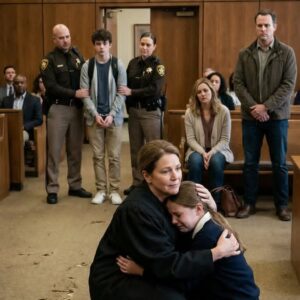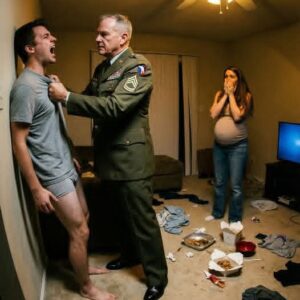The phone felt impossibly heavy in Abigail’s small hands. She had rehearsed what to say a dozen times in her head, the words a desperate mantra against the gnawing emptiness in her stomach. But now that the moment had arrived, her throat tightened with a fear so profound it was almost paralyzing. The operator’s voice crackled through the speaker, distant and professional.
“911. What’s your emergency?”
Abigail inhaled shakily, the sound loud in the silent apartment. “My name is Abigail Pierce. I’m nine. I haven’t eaten in four days, and my little brother is too weak to stand up.”
Her voice barely rose above a whisper, her eyes darting to the bedroom door, checking for shadows in the gap beneath it.
“Where are you, Abigail? Is there an adult with you?”
“Apartment 4B, Pinecrest Apartments on Maple Street,” she recited, the address memorized and practiced. “My mom’s at work. Her boyfriend is supposed to watch us, but he…” She swallowed hard, the effort painful. “He doesn’t feed us when Mom’s gone.”
“Okay, Abigail, you’re being very brave. I’m sending help right away. Can you stay on the phone with me?”
Abigail nodded before remembering the woman couldn’t see her. “Yes… but please hurry. Aiden is really sick.”
She crept back to the bedroom they shared, a small, dim space that smelled of stale air and childish fear, the phone pressed to her ear. Aiden lay curled on the lower bunk, his five-year-old body limp and still. His eyes were half-closed, his thumb tucked in his mouth—something he hadn’t done since he was four. His brown hair stuck to his forehead with sweat despite the chill in the apartment.
“It’s okay,” she whispered, smoothing his hair back from his pale face. “Help is coming.”
He didn’t respond, not even to blink at her. The hollows beneath his eyes had deepened over the past week, and his pajamas, once snug, now hung loose on his frail frame.
“Abigail,” the operator asked, her voice a calm anchor in the chaos of Abigail’s mind. “Are you still there? Can you unlock the front door for the paramedics?”
“I don’t have a key,” she replied, a fresh wave of despair washing over her. “Richard locks it from the outside sometimes.”
There was a brief pause on the line, a silence filled with unspoken professional concern. “Where is Richard now?”
“He left. He gets mad when Aiden cries about being hungry, so he goes out.” Abigail pulled the thin, worn blanket higher over her brother’s shoulders. “I tried to find food, but the cabinet has a lock on it now, and I couldn’t get it open.”
The wail of sirens grew louder outside, and Abigail felt a rush of relief so intense her knees nearly buckled. She moved to the window, pushing aside the faded curtain. Red and blue lights flashed across the dirty glass, painting the dingy room in frantic strokes of color.
“They’re here,” she said, tears suddenly streaming down her face. “I see them.”
“Good girl. Stay on the line until they reach you, okay?”
“Okay.” Abigail watched as two police officers approached the building entrance, followed by paramedics carrying bags and a stretcher. She pressed her palm against the cold glass, willing them to move faster. A sharp bang on the apartment door made her jump.
“Police! Is anyone inside?”
Abigail ran to the door, her socks sliding on the linoleum floor. “We’re locked in! Please help us!”
What followed happened in a blur: the splintering sound of the door being forced open; uniformed figures filling the small, dark apartment; a female officer kneeling before her, asking gentle questions while paramedics rushed to Aiden’s side.
“My name is Detective Porter,” the woman said, her dark eyes kind but intense. “Can you tell me what happened, Abigail?”
Abigail nodded, suddenly feeling dizzy. “Richard doesn’t let us eat when Mom’s at work. He says we waste food, but he eats in front of us.” Her stomach cramped painfully, a sensation so familiar now she barely winced. “Aiden got really sick yesterday. I tried to make him drink water, but he kept falling asleep.”
Detective Porter’s expression remained calm, but something flickered behind her eyes. “When was the last time you ate anything?”
Abigail thought carefully, her young mind struggling to track the days through a fog of hunger. “Richard gave us each half a sandwich on Monday.”
“Today’s Friday.” The detective’s hand tightened almost imperceptibly on her notepad. “And where is your mother?”
“She works at the hospital. Double shifts this week.” Abigail glanced toward the bedroom where paramedics were lifting Aiden’s limp form onto a stretcher. “She doesn’t know. Richard tells her he feeds us good dinners.”
“How can we contact your mother?”
“Her number is by the phone.” But Abigail hesitated, twisting the hem of her too-large t-shirt. “Can I bring something? I need to get something before we go.”
After Detective Porter nodded, Abigail darted to her side of the shared bedroom. She knelt and pulled a loose floorboard away from the wall, revealing a small, hidden cavity. From it, she extracted a battered composition notebook, its cover decorated with stick figures drawn in colored pencil. She clutched it to her chest as she returned to the detective.
“I wrote everything down,” she explained, her chin lifting with a fragile pride. “The dates and what happened. My teacher said journals are important records, so I made one.”
Detective Porter gently accepted the notebook. “This was very smart of you, Abigail.” As the detective flipped through the first pages, her professional composure cracked for just a moment, replaced by a flash of raw anger. Abigail knew what she was seeing: careful, childish handwriting documenting meals denied, food locked away, punishments for complaining about hunger. Simple, heartbreaking illustrations accompanied some entries: a clock showing when Richard left them alone; a drawing of their empty refrigerator; a sketch of Aiden crying, a speech bubble above his head saying, “My tummy hurts.”
“Abigail,” Detective Porter said finally, her voice slightly rougher than before. “This is very important. You did exactly the right thing by calling for help and keeping this journal.”
A paramedic approached, her face kind. “We need to take you and your brother to the hospital now. Are you feeling strong enough to walk?”
“I can walk,” Abigail insisted, though her legs trembled. “But I want to stay with Aiden. He gets scared without me.”
“You’ll ride in the same ambulance,” Detective Porter assured her. “I’ll be right behind you, and we’ll contact your mother from the hospital.”
As they guided her toward the door, Abigail cast one last glance around the apartment: at the spotless kitchen where they weren’t allowed to touch anything; at Richard’s expensive gaming setup in the living room; at the cabinet secured with a combination lock where she knew cereal, pasta, and canned goods were tantalizingly out of reach. In the ambulance, a paramedic secured an IV line to Aiden’s thin arm. Abigail watched the clear liquid dripping into the tube, wondering if it would make him feel better. They had tried drinking extra water from the bathroom sink, but it hadn’t helped the gnawing emptiness in their stomachs.
The paramedic offered her a small juice box. “Drink this slowly,” she said. “Just tiny sips.”
Abigail took the box with shaking hands, the weight of it absurdly precious. As the sweet apple juice spread across her tongue, fresh tears sprang to her eyes. She forced herself to pause between sips, remembering how she’d gotten sick the last time she’d eaten too quickly after going hungry. As the ambulance raced through the streets of Clearwater, Abigail kept her gaze fixed on Aiden’s pale face. She had done what she promised herself she would do if things got really bad. She had called for help. She had shown them her journal. Now came the hardest part: facing what would happen next.
In a private waiting room on the pediatric floor, Abigail sat with her legs pulled up on the chair, a hospital blanket wrapped around her shoulders. They had run tests, given her more juice and something called electrolytes, and a kind nurse had helped her shower and change into clean hospital pajamas. The dizziness that had plagued her was beginning to recede, but a different kind of disorientation remained.
The door opened and a woman rushed in. “Abigail!”
“Mom,” Abigail whispered, a complex wave of emotions washing over her: relief, love, and an undercurrent of something else—fear, betrayal.
Audrey Pierce looked nothing like the confident nurse she had once been. Her hospital aide scrubs hung on her thin frame, her blonde hair pulled back in a messy ponytail, dark circles prominent beneath her eyes. She fell to her knees before Abigail’s chair, reaching to pull her daughter into a tight embrace.
“What happened? They called me… they said you and Aiden…” Her voice broke. “They said you were starving. How is that possible? Richard said everything was fine when I called home.”
Abigail stiffened slightly in her mother’s arms. “Richard doesn’t feed us when you’re gone,” she said simply.
Audrey pulled back, her face contorted in disbelief. “That can’t be true. He wouldn’t—”
“Mrs. Pierce.” Detective Porter entered the room, her badge visible on her belt. “I’m Detective Grace Porter. We need to talk about your children’s condition and the circumstances we found them in.”
Audrey stood, one hand still on Abigail’s shoulder. “There must be some mistake. Richard has been watching them for months while I work. He would have told me if there were problems.”
“Mrs. Pierce,” the detective continued, her voice level. “Both your children are severely malnourished. Your son is currently receiving emergency treatment. The doctors have confirmed their condition is consistent with prolonged food deprivation.”
“That’s impossible!” Audrey’s voice rose. “I buy groceries every week! The refrigerator was full when I left for work yesterday!”
“Full, but locked,” Abigail said quietly. “He puts a lock on it.”
Audrey’s face paled. “What?”
“Your daughter made a very brave call today,” Detective Porter said, placing a hand on Abigail’s shoulder. “She also kept this.” The detective handed over the evidence bag containing Abigail’s journal.
Audrey took it with trembling hands, her eyes widening as she read the first page visible through the plastic: April 15th. Richard said no breakfast because Aiden spilled his water yesterday. Mom left for work at 6:30. Richard ate eggs and toast. We got to have water.
“This can’t be real,” Audrey whispered, looking at Abigail with horror. “Why didn’t you tell me?”
Abigail’s eyes filled with tears. “I tried. Remember when I said Aiden and I were still hungry after dinner? You said Richard told you we’d had seconds already and were just being greedy.”
The color drained from Audrey’s face as the memory surfaced. She had been exhausted that night, irritable from a twelve-hour shift. Richard had been so understanding, taking her side, offering to handle the children so she could rest.
“A social worker will be here soon,” Detective Porter said, her tone softening slightly. “And a detective from Crimes Against Children will need to take formal statements.”
“Where’s Aiden now?” Audrey asked, her voice hollow.
“In the pediatric ICU. They’re treating him for dehydration and malnutrition. The doctor will update you shortly.”
Audrey sank into a chair, the journal still clutched in her hands. “I don’t understand. Why would he do this?”
Abigail remained silent. She had asked herself the same question countless times. Why did Richard smile when he took away their food? Why did he seem to enjoy watching them hunger? The answer remained elusive, like so many things in the adult world.
Detective Porter’s phone buzzed. She checked it and nodded grimly. “Officers have located Mr. Tanner. He’s being brought in for questioning.”
At the mention of Richard’s name, a chill passed through Abigail. She pulled the blanket tighter. “Can I see Aiden?” she asked in a small voice.
The detective looked at her with something like respect. “I’ll check if that’s possible now. The doctors are taking good care of him.”
As Detective Porter stepped out, Abigail found herself alone with her mother. The silence between them felt vast and unfamiliar.
“I kept the journal in case anyone ever asked,” Abigail finally said, her voice barely audible. “I thought maybe someone would notice at school, but they didn’t.”
Audrey looked at her daughter as though seeing her for the first time—not just the thinness of her face or the prominence of her collarbones, but the profound weariness in her eyes, the eyes of a child who had carried an adult’s burden. “I’m so sorry,” Audrey whispered, the words painfully inadequate. “I should have known.”
Abigail nodded slightly, neither accepting nor rejecting the apology. The truth was more complicated than blame or forgiveness. In her nine-year-old mind, she understood something that would take her mother much longer to grasp: that their healing would be as slow and careful as the feeding that would gradually restore their bodies.
The morning sun cast pale rectangles of light across the worn carpet of Eleanor Pierce’s living room. It had been five days since the 911 call, three since they’d left the hospital and moved in with their grandmother. Abigail sat cross-legged on the floor beside a stack of board games, methodically checking each one to ensure all the pieces were present, a soothing ritual in a world turned upside down.
“You don’t need to organize those, Abby,” Eleanor said gently as she entered with a tray. “I’ve brought your snack.”
Abigail glanced up at the plate of apple slices, cheese cubes, and crackers. Her grandmother had been offering food at regular intervals with a consistency that both comforted and overwhelmed her.
“Is there one for Aiden, too?”
“Of course. He’s still napping.”
The kitchen in Eleanor’s small suburban home was nothing like the sterile, off-limits one in Richard’s apartment. Cheerful yellow curtains framed windows overlooking a small garden. Refrigerator magnets held children’s drawings. Most importantly, there were no locks on any of the cabinets.
“Detective Porter called while you were helping Aiden with his bath,” Eleanor mentioned casually. “She’d like to come by this afternoon to talk with you a bit more.”
“About my journal?”
“Yes, about that and some other things.”
“Will Mom come today?” The question hung in the air. Audrey had visited only once since the children had been released into Eleanor’s temporary custody. The visit had been stilted, filled with Audrey’s tearful apologies.
“Not today, sweetheart. Your mother is meeting with her own lawyer to sort some things out.”
“Is Richard in jail?” Abigail asked suddenly.
Eleanor took a deliberate sip of her coffee. “He was arrested, but he’s out on bail right now.”
“I know what bail is,” Abigail interrupted. “It means he gave money so he could go home until his trial. They explain it on police shows.”
A small sound from the doorway drew their attention. Aiden stood there, his hair tousled from sleep. He nodded silently when Eleanor offered him a snack, his gaze fixed on the plate.
“Come sit by me,” Abigail patted the chair beside her. “Grandma made the cheese in little cubes, just how you like it.” As Aiden climbed onto the chair, Abigail subtly pushed her own plate closer to him, a gesture Eleanor pretended not to notice. The protectiveness between the siblings was a double-edged sword. While their bond had undoubtedly helped them survive, Abigail’s sense of responsibility for her brother was far beyond what any nine-year-old should carry.
That afternoon, Detective Porter arrived with Dr. Melanie Winters, the court-appointed psychologist. “We’re trying to minimize how many times the children need to recount their experiences,” Dr. Winters explained.
While the children were upstairs showing Dr. Winters their room, Detective Porter stayed behind with Eleanor, pulling several photographs from her briefcase. “We executed a search warrant on the apartment yesterday. I wanted you to see what we found.”
Eleanor examined the photos with growing horror: the padlocked refrigerator, the cabinet with a combination lock, a closet in the master bedroom stocked with snacks and junk food.
“This was in Richard Tanner’s bedside drawer,” Detective Porter added, showing her a small notebook. “It contains the times Audrey called home each day, what the children allegedly ate, and script notes—things to say if she asked about meals.”
“He planned it all,” Eleanor whispered, her hand covering her mouth.
“Very methodically. We’ve also confirmed Abigail’s account of being locked in. The deadbolt had been modified to require a key from both sides.”
“How could Audrey not know?”
“That’s what we’re trying to determine,” the detective’s expression hardened slightly. “Your daughter maintains she had no knowledge of the food restriction. She admits she was aware of the locks, but says Richard convinced her they were necessary because Aiden had wandered out of the apartment once.”
“And you don’t believe her?”
“It’s not a question of belief, but evidence. At minimum, there was serious neglect through inattention. At worst… complicity,” Eleanor finished, the word bitter on her tongue.
Upstairs, Dr. Winters had created a comfortable space on the bedroom floor with cushions and a special set of dolls. “Sometimes it’s easier to show things with dolls than to just talk about them,” she explained.
With hesitant movements, Abigail arranged the scene: the mother doll leaving for work, the man doll in the living room, the child dolls in their bedroom. Then she closed the tiny refrigerator door and pantry cabinets, using a small paperclip to simulate a lock.
“He put locks on the food,” she explained. “Big ones with numbers you have to know.”
“And what would happen at dinnertime?”
Abigail moved the man doll to the miniature kitchen table. “Richard would eat. Sometimes he’d give us a little food, sometimes not.”
“Why would he not give you food?”
“He said we had to earn it by being good. Or sometimes he said we were too fat and needed to learn discipline.”
Aiden suddenly spoke up. “He ate ice cream. I could hear him at night. And he said if we told Mom, he would know, and then we wouldn’t get to eat for a whole week. He said no one would believe us anyway.”
“But you did tell someone,” Dr. Winters pointed out.
“I didn’t know what else to do,” Abigail looked down. “Aiden couldn’t get up anymore.”
For the next hour, Dr. Winters gently encouraged the children to express their experiences. She observed how Aiden deferred to his sister, how Abigail constantly positioned herself between the boy and the door. Before leaving, she leaned forward slightly. “What would help you feel safe right now?”
The siblings exchanged glances. “We want to stay with Grandma,” Abigail said firmly. “And we don’t want to see Richard ever again.”
“What about your mom?”
Aiden looked at his sister, waiting for her answer. “I don’t know,” Abigail admitted. “She didn’t believe me when I tried to tell her before.”
“She believed him instead of us,” Abigail replied, her voice rising slightly. The raw hurt filled the room. Dr. Winters nodded. “You’re right to feel that way, Abigail. Trust has to be earned back, and that takes time.”
Two weeks later, the courtroom felt impossibly large to Abigail. She sat on a wooden bench outside, hands folded tightly in her lap. Today was the preliminary hearing, the first time she would see Richard Tanner since that terrible day.
The district attorney carefully walked Abigail through the contents of her journal, asking her to explain certain entries.
“On this page,” the attorney said, displaying a photograph of an entry from March, “you’ve drawn what looks like a timer. Can you explain what that represents?”
“That’s when Richard would make us sit at the table and watch him eat,” Abigail explained. “Sometimes he would set the timer for how long we had to sit there without touching anything.”
A murmur ran through the courtroom.
“And this entry from April 8th, where you’ve written ‘water only day.’ What does that mean?”
“That was when Richard said food was a privilege, not a right. He said we could have all the water we wanted, but no food until we learned to be grateful.”
Her testimony continued, clear and unshakable. When it was over, Abigail couldn’t resist a single glance back at Richard. He was staring at her, his expression no longer a controlled mask but twisted with a pure, undisguised hatred that chilled her to the core.
In the hallway, they spotted her mother. “I heard you did wonderfully in there,” Audrey said, her voice unsteady.
“Are you going to testify, too?” Abigail asked.
“Yes, tomorrow. I need to tell the judge that I didn’t know.”
Something hardened in Abigail’s expression. “But you did know about the locks.”
“I thought they were just to keep you from snacking too much! Richard said—”
“You believed him instead of us,” Abigail interrupted, her control finally shattering. “You never looked in the refrigerator when you got home! You never noticed how hungry we were! You never saw that Aiden’s clothes were getting too big! How could you not know?”
“I was working so much…” Audrey sobbed.
“I was trying to keep Aiden alive!” Abigail shouted, the outburst echoing through the hallway. “I’m nine! It wasn’t supposed to be my job!”
Later that day, Detective Porter came to the private waiting room with news. “After your testimony, Richard’s lawyer asked for a break. When they came back, Richard changed his plea to guilty.”
Abigail’s eyes widened. “What does that mean?”
“It means he’s admitting to what he did. You won’t have to testify again. Your journal and your testimony today were so strong that he and his lawyer knew they couldn’t win.”
“Will he go to jail?”
“Yes,” the detective said. “For quite a long time, we expect.”
One more piece of news followed. The local food bank, where her mother had once volunteered, had an idea inspired by Abigail’s story. “They’re starting a new program for kids who don’t have enough food at home,” the detective explained. “And they’ve asked if they could name it after you.”
“After me?”
“Yes. The Abigail Project. They want to create special backpacks of food that kids can take home on weekends. No questions asked.”
For the first time that day, a small smile flickered across Abigail’s face. “Would it help other kids like me and Aiden?”
“Exactly like that.”
Six months later, Abigail walked through the doors of Westside Elementary, a new backpack slung over her shoulder. The past months had seen gradual, careful steps toward reunification. The children still lived primarily with Eleanor, but weekend stays at Audrey’s renovated apartment had become a new routine.
That afternoon, they had their first volunteer orientation at The Abigail Project. The food bank was a bustling hub of activity. “We’ve served over three hundred children since the program started,” the coordinator, Marissa Feldman, told Audrey quietly. “The school counselors report that attendance on Mondays has improved for participants.”
Abigail approached the task of packing backpacks with characteristic meticulousness, carefully counting items. These were remnants of her survival mechanisms, now channeled toward helping others.
That evening at Audrey’s apartment, a Thursday night addition to their schedule, represented another small step. The apartment bore little resemblance to the place where they had suffered; Audrey had moved to a different building entirely.
“When are we moving back here for real?” Aiden asked during their bedtime story.
Audrey glanced at Abigail, whose expression remained neutral. “How do you feel about it, Abby?”
Abigail was quiet for a long moment. “And it would just be us? Just our family?” The unspoken part—no Richard, no new boyfriend—hung in the air.
“Just us,” Audrey confirmed. “That’s a promise.”
Abigail seemed to consider this seriously. “Maybe after Christmas,” she said finally. “When I finish my fall journal.”
Three days before Christmas, Abigail sat on her bed at Eleanor’s house, completing the final entry in that journal. The butterfly cover was worn at the edges, the pages filled with therapy insights and increasingly hopeful reflections.
December 22nd. Today we packed special holiday backpacks at The Abigail Project. Each one had hot chocolate packets and a new book. Mr. Feldman said we’ve helped over 500 kids since summer. That makes me feel like maybe the bad things happened for a reason. Aiden hasn’t had a nightmare in 31 days. Tomorrow, we’re having the special meeting with the judge to talk about moving back with Mom. I think I’m ready. Dr. Winters says my heart knows when it’s time, and I should trust it. My heart says it’s time.
She closed the book just as Eleanor appeared in the doorway. “All packed for tomorrow?”
Abigail nodded, retrieving a small wrapped package from her desk. “I made you something.”
The next day, the judge officially approved the reunification plan. That evening, as they prepared for their first night back at Audrey’s, Abigail placed her completed journal and a new, blank one on her bedside table. The old and the new, side-by-side, representing where they had been and where they were going.
Outside, the snow continued to fall gently, covering Clearwater in a blanket of pristine white. Inside, a family prepared to turn a new page. Abigail Pierce, who had once been brave enough to make a desperate phone call, was now brave enough to believe in new beginnings. Her journal of hunger had become evidence that brought justice. Her journals of healing had become a testament to resilience. And her newest journal, with its blank pages awaiting tomorrow’s experiences, represented the most precious gift of all: a future.





